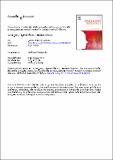Files in this item
The influence of mood and attitudes towards eating on cognitive and autobiographical memory flexibility in female university students
Item metadata
| dc.contributor.author | Mang, Luisa | |
| dc.contributor.author | Ridout, Nathan | |
| dc.contributor.author | Dritschel, Barbara | |
| dc.date.accessioned | 2019-08-17T23:41:34Z | |
| dc.date.available | 2019-08-17T23:41:34Z | |
| dc.date.issued | 2018-11 | |
| dc.identifier | 255479965 | |
| dc.identifier | bb0033f9-0a5a-40c1-af45-2f7630160a74 | |
| dc.identifier | 85052923914 | |
| dc.identifier | 000449902700066 | |
| dc.identifier.citation | Mang , L , Ridout , N & Dritschel , B 2018 , ' The influence of mood and attitudes towards eating on cognitive and autobiographical memory flexibility in female university students ' , Psychiatry Research , vol. 269 , pp. 444-449 . https://doi.org/10.1016/j.psychres.2018.08.055 | en |
| dc.identifier.issn | 0165-1781 | |
| dc.identifier.other | RIS: urn:3C4CD2B16A081649A7856ADBF083991C | |
| dc.identifier.other | ORCID: /0000-0002-0909-6323/work/64698262 | |
| dc.identifier.uri | https://hdl.handle.net/10023/18331 | |
| dc.description.abstract | Cognitive flexibility, as measured through set-shifting ability, appears to be impaired in patients with eating disorders (EDs). Thus, it is important to determine if the switching deficit seen in clinical eating disorders generalizes to participants with a subclinical disordered eating. Another deficit manifested by clinical and subclinical disordered eating is the ability to retrieve specific autobiographical memories. It is possible that deficits in autobiographical memory retrieval extends to the ability to shift between retrieving specific versus general autobiographical memory information, a function important for problem –solving and emotion regulation. Therefore, the aims of the present study were to determine whether deficits in set-shifting are evident in a non-clinical sample of female university students with eating concerns, and whether inflexibility is also manifested in autobiographical memory retrieval. Sixty-nine female undergraduate students completed a measure of autobiographical memory flexibility, a set-shifting task (Brixton Spatial Anticipation Test) and measures of mood, ruminative thinking, and eating habits. After controlling for mood and rumination, bulimic traits predicted set-shifting ability and flexibility in autobiographical memory retrieval. Thus, flexibility deficits appear to manifest at the subclinical level, are evident in different domains, and appear to be related to bulimic traits, such as binge eating. | |
| dc.format.extent | 6 | |
| dc.format.extent | 921406 | |
| dc.language.iso | eng | |
| dc.relation.ispartof | Psychiatry Research | en |
| dc.subject | Autobiographical memory | en |
| dc.subject | Executive functions | en |
| dc.subject | Cognitive flexibility | en |
| dc.subject | Bulimia | en |
| dc.subject | Anorexia | en |
| dc.subject | BF Psychology | en |
| dc.subject | RC0321 Neuroscience. Biological psychiatry. Neuropsychiatry | en |
| dc.subject | NDAS | en |
| dc.subject.lcc | BF | en |
| dc.subject.lcc | RC0321 | en |
| dc.title | The influence of mood and attitudes towards eating on cognitive and autobiographical memory flexibility in female university students | en |
| dc.type | Journal article | en |
| dc.contributor.institution | University of St Andrews. School of Psychology and Neuroscience | en |
| dc.contributor.institution | University of St Andrews. Institute of Behavioural and Neural Sciences | en |
| dc.identifier.doi | 10.1016/j.psychres.2018.08.055 | |
| dc.description.status | Peer reviewed | en |
| dc.date.embargoedUntil | 2019-08-18 | |
| dc.identifier.url | https://www.sciencedirect.com/science/article/pii/S0165178117320541?via%3Dihub#sec0022 | en |
This item appears in the following Collection(s)
Items in the St Andrews Research Repository are protected by copyright, with all rights reserved, unless otherwise indicated.

